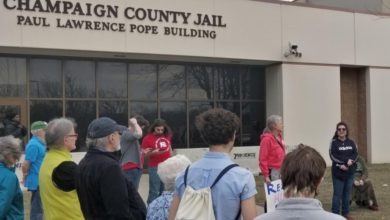The United States, the so-called model of democracy, imprisons more people than any other country in the world. While people in the U.S. account for only 5 percent of the world’s population, the 2.4 million people languishing in U.S. jails and prisons account for a whopping 25 percent of the world’s prisoners.
Despite the dramatic 700 percent increase in the U.S. prison population between 1970 and 2005, the most significant growth has been in the for-profit private prison industry. It grew by an astounding 1,600 percent between 1990 and 2009. For-profit prisons run by private companies hardly existed before 1980, but in the three decades since have used their massive profits to gain political clout and accelerate the growth of mass incarceration.
Statements released by the Corrections Corporation of America, the largest private prison company in the world, reveal the corporate interests at play in the maintenance of draconian sentencing laws that contribute to growing rates of mass incarceration:
“Our growth is generally dependent on our ability to obtain new contracts … any changes with respect to drugs and controlled substances or illegal immigration, could affect the number of people arrested, convicted and sentenced, thereby reducing demand for our correctional facilities to house them.”
In 2010, as the economy was struggling to recover from the Great Recession, the two largest private prison companies—CCA and the GEO Group—secured an enormous $3 billion in profits. This money, like the notorious bailouts for the criminal Wall Street bankers, was funneled from tax payers at the behest of federal and state politicians into the pockets of a relatively few prison industrial complex capitalists.
What this collusion at the highest levels of business and government on behalf of the for-profit prison industry reveals is the exploitation of wider sectors of society by the capitalist class. Mass incarceration is maintained as a source of enormous profit; repression—expressed in arrests, convictions and sentencing by the state—is a pre-condition of these ill-gotten gains.
That this repression falls hardest on the most marginalized sectors of society embellishes this point. Harsh laws enforced by racist police contribute to disproportionate incarceration of people of color and fill our jails with nonviolent offenders. In states with the largest prison populations, people of color constitute over 89 percent of the for-profit inmate population in California, 71 percent in Texas and 65 percent in Arizona. Nearly half of all undocumented immigrants detained by the U.S. government are housed in for-profit private detention centers.
Further, whereas the racial component of mass incarceration reveals the severity of national oppression under capitalism, the explosive growth of the for-profit prison industry reveals the wider exploitation of the U.S. working class, as well as the chronic mass unemployment inherent in the capitalist system. Despite massive profits, conditions within private prisons are often worse than in public ones, with higher rates of violence against prisoners and filthy, rat-infested cells that smell of urine.
Rehabilitation programs are not considered cost-effective in these prisons, so that upon release former prisoners have been essentially stripped of their ability to find a job and meaningfully reenter society. This increases the likelihood that former inmates will be back in the prison system before long, and exposes the people-as-profit mentality behind the growth of the for-profit prison industry.
Progressives must oppose politicians and law makers who serve corporate interests, and build solidarity with our brothers and sisters behind bars!





